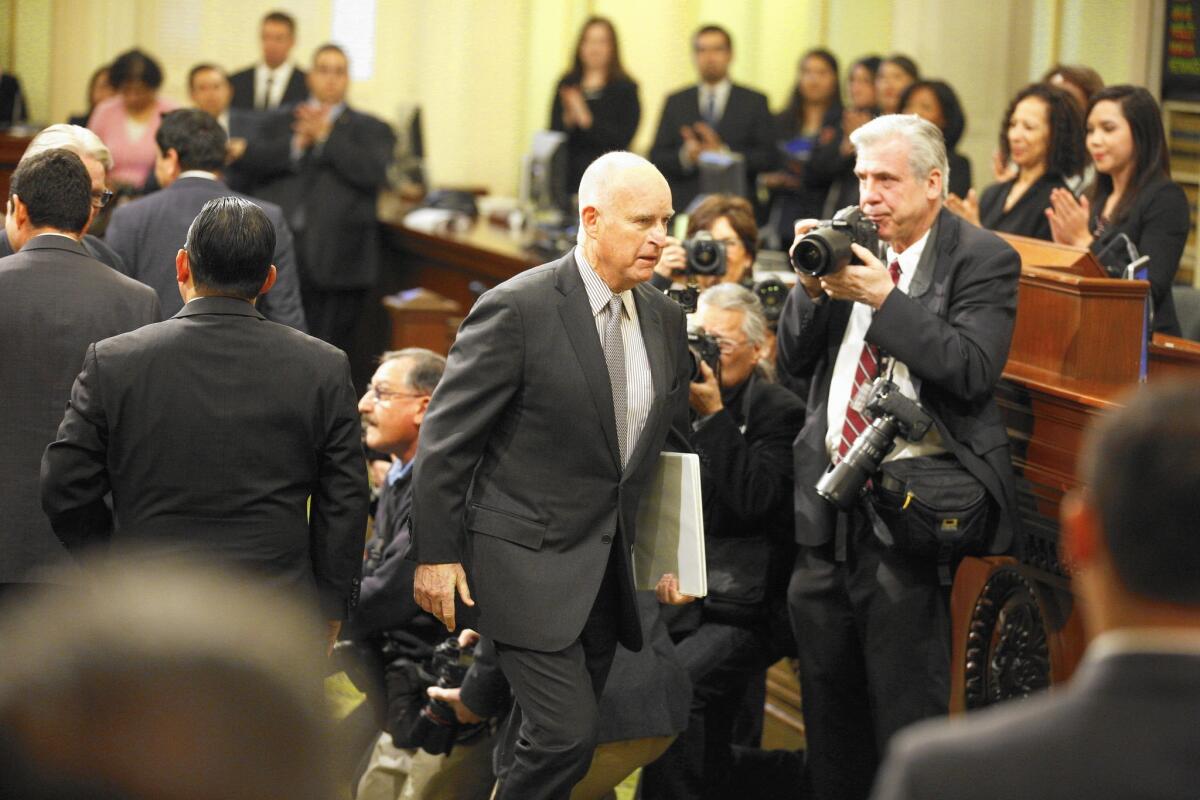Capitol Journal: School bonds used to be as controversial as mom and apple pie. Not anymore under Gov. Jerry Brown

- Share via
Reporting from In Sacramento — It’s a sign of our contentious times and California’s contrarian governor that people are even bickering over routine state school construction bonds.
Selling state bonds to help local districts build new schools and modernize old ones used to be about as controversial as motherhood and apple pie. No longer.
Practically everything these days seems politically divisive.
Proposition 51 on the November state ballot is a low-profile issue for most voters, one of those wonky eye glazers. But behind the scenes the ballot initiative has stirred turmoil, mainly because of Gov. Jerry Brown.
Brown is bothered by the whole state school bond system. He thinks it’s too favorable to large and financially stable districts and is unfair toward smaller and poorer ones.
That’s vintage Brown. He tends to give middle-class districts short shrift and prioritizes spending on disadvantaged schools. That’s apparently a holdover from his early monk life as a Jesuit seminarian.
Proposition 51 would authorize $9 billion in state school bonds. Specifically, it would provide $3 billion for new construction, $3 billion for modernization, $2 billion for community colleges, plus $1 billion for charter schools and vocational education facilities.
In the K-12 schools, local voters must authorize district bonds for a specific project. Then the local money is matched by the state. Generally, the state pays for half of new construction and 60% of modernization.
For community colleges, there’s no set local contribution. But the more local funding there is, the better the odds of obtaining state money.
Right now, there’s virtually no state money for any school facilities. And there’s a big backlog of projects that need funding.
Unless the state kitty is soon replenished, some projects will be scrapped. Others will be bankrolled by greatly jacking up developer fees on new housing. That, in turn, will escalate the cost of new houses in a state where home buying is increasingly unaffordable for many.
Under California’s complex school bond system — and Brown is correct about it being too convoluted — districts can raise construction capital by charging developer fees.
Generally, new school construction winds up being financed one-third each by local property taxpayers, developers and the state.
It’s why home builders are financing Proposition 51. They want to avoid paying higher developer fees and trying to pass them on to buyers.
Dave Cogdill, president of the California Building Industry Assn., says the increased fees would raise new home prices statewide, on average, by $10,000 to $15,000. But, depending on the area, the boosts could range from $5,000 to $40,000.
“For those who believe that somehow it’s going to come out of developers’ profits, that’s not how it works,” Cogdill says. “If it doesn’t pencil out, it’s not going to get built.”
Normally, the Legislature and the governor would have placed the bond proposal on the ballot. But they balked. So the builders paid for signature collecting to qualify the initiative.
Cogdill says they’ll spend around $10 million on the campaign.
Opponents aren’t raising anything. Brown has more pressing priorities. And that’s a big reason why he and the Legislature never got around to handling the bond topic in the Capitol.
Back in 2012, says Cogdill, a former state Senate Republican leader, builders asked Brown to support a school bond measure. But the governor was focused on the budget deficit and trying to persuade voters to approve his income tax increase on the wealthy.
“He said, ‘That’s all I want to deal with,’” Cogdill recalls. “We said, ‘We understand. We’re willing to help you.’ And we became the first business organization to support Prop. 30.”
Then in 2014, Brown was running for reelection and didn’t want any borrowing measure on the ballot with him, Cogdill says. Because of the drought, however, the governor was forced to accept a water bond.
Meanwhile that year, a school bond was sailing through the Legislature. It passed the Assembly and three Senate committees without a single “no” vote, 127-0. But Brown made sure it died before reaching the Senate floor.
“We had several long meetings with the governor’s staff,” says former Assemblywoman Joan Buchanan (D-Alamo), the bill’s author. “But the governor never came up with anything concrete. I think it’s because he’s just philosophically against bonds — unless for a [bullet] train or [delta water] tunnel.”
Brown began critiquing the state’s school bond system in writing.
Districts now can pass their own bonds on a 55% local vote, he pointed out. School enrollments are expected to decline. The state already is paying $2.7 billion annually on K-12 and community college bonds and the latest proposal would add $500 million. The current system favors schools that can afford full-time staffs to lobby for bond money.
This year, there was some effort to negotiate a compromise on a smaller bond. But talks broke down. They seemed half-hearted anyway. Both sides claimed they were stiffed.
One certain truth: The California Teachers Assn. and other sponsors of Proposition 55 to extend the “temporary” Proposition 30 tax hike feared that a school bond proposal would compete with them for the pro-education vote.
Brown says Proposition 51 “is a blunderbuss effort that promotes sprawl and squanders money that would be far better spent in low-income communities.”
OK, but the governor and the Legislature have had four years to fix whatever flaws they perceive. And they’ve failed.
It’s time to replenish the pot.
Follow @LATimesSkelton on Twitter
To read the article in Spanish, click here
ALSO
Gov. Jerry Brown opposes $9-billion school bond measure
Proposition 53 is a ballot measure Gov. Brown hates, but it’s one voters should love
More to Read
Get the L.A. Times Politics newsletter
Deeply reported insights into legislation, politics and policy from Sacramento, Washington and beyond. In your inbox three times per week.
You may occasionally receive promotional content from the Los Angeles Times.











